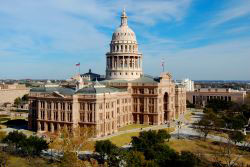This blog post continues the focus of the Law School’s Lubar Center on redistricting.
Whose maps are least changed of all?
Change, like beauty, appears to be in the eye of the beholder.
After the Wisconsin Supreme Court ruled that new legislative an d congressional district maps must change as little as legally possible from the current maps, observers saw it as a win for the Republicans and conservatives who sought that ruling. Democrats have condemned the maps drawn in 2011 as an extreme partisan gerrymander that has locked in GOP control of the Legislature for the past decade.
d congressional district maps must change as little as legally possible from the current maps, observers saw it as a win for the Republicans and conservatives who sought that ruling. Democrats have condemned the maps drawn in 2011 as an extreme partisan gerrymander that has locked in GOP control of the Legislature for the past decade.
But while least-change maps are sure to be Republican-majority maps, they’re not necessarily going to be the same maps that the GOP-controlled Legislature approved last year, only to be vetoed by Democratic Gov. Tony Evers. And the ruling hasn’t driven all the rival map-changers out of the courtroom.
Instead, Justice Rebecca Bradley’s majority opinion has prompted a legal debate over exactly what “least change” means—and a contest in which nearly all of the parties are competing to convince the court that their preferred maps would change less than those submitted by their opponents.

 If you’re like the rest of the United States, then you are aware of the recent attempts to restrict the right to abortion pre-viability — a right affirmed by the Supreme Court in Planned Parenthood v Casey., 505 U.S. 833. Despite the holding in Planned Parenthood, States continue to pass legislation restricting abortion. In some States, these attempts are no more than a brazen attempt to ban nontherapeutic pre-viability abortions.
If you’re like the rest of the United States, then you are aware of the recent attempts to restrict the right to abortion pre-viability — a right affirmed by the Supreme Court in Planned Parenthood v Casey., 505 U.S. 833. Despite the holding in Planned Parenthood, States continue to pass legislation restricting abortion. In some States, these attempts are no more than a brazen attempt to ban nontherapeutic pre-viability abortions. Prof. Rick Hasen of UCLA, an expert in election law, had an
Prof. Rick Hasen of UCLA, an expert in election law, had an